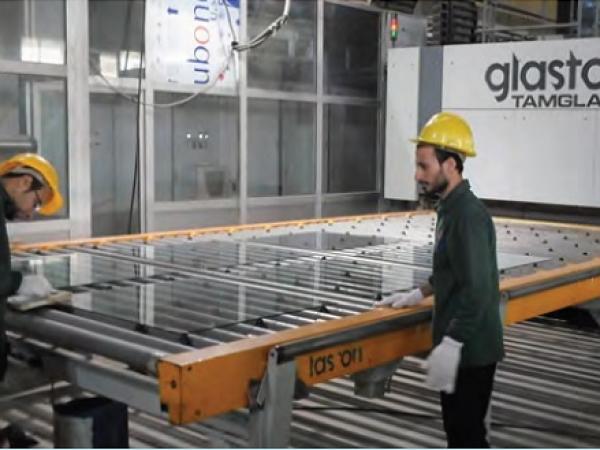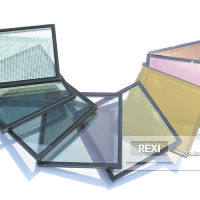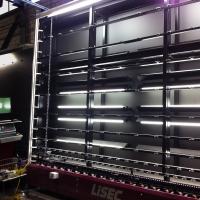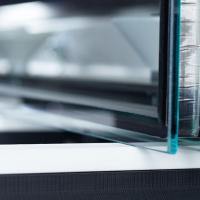The company prides itself on designing and delivering truly aesthetic, economical and high-performance glass and aluminum solutions. With Glaston FC500™, AluNile has expanded its capacities to process all types of highly demanding glass products for the Egyptian market, enabling it to become the undisputed leader.
Founded in 1999, AluNile continued the heritage of one of the leading aluminum fabricators in Egypt. In 2008, the company built its first glass-processing factory. Today, the company has some of the most advanced glass-processing equipment in the entire Middle East. Processed products include heat-treated glass, curved tempered glass, insulating glass, laminated and silk-screened glass, and much more.
FIRST FC500™ FURNACE OUTSIDE FINLAND
“We are especially proud of being the first outside Finland to buy the new Glaston FC500™ tempering furnace. We signed the contract in 2010, and Glaston delivered the furnace to our facilities in 2011,” says Seif Eissa, Managing Director of AluNile.
“This was the first time we purchased a Glaston machine. We knew Glaston machinery is the best in the world, and the company is well known to anyone in our industry,” he continues.
Seif visited Glasstec in 2010, where Glaston launched the FC500™ together with iControL™, the completely new automation system, which were received very well by the market right from the start.
“Later, we inspected the prototype furnace in Finland to see that the glass quality would meet our expectations – and it definitely did!” Seif says and continues to admit being anxious at the time about being one of the first processors to buy the FC500™. “But Glaston promised to give us any extra support, if needed. And in the end, everything turned out fine,” he emphasizes.
“Glaston has very professional people – and they make sure to put the right person on the job for each step, for instance, the electrician, the mechanic, the trainer. We did not experience any problems whatsoever with the furnace’s operations or quality. And more importantly, the entire project took place in a timely manner. Our operators, too, saw a significant improvement over the furnaces we had purchased earlier from China. So, everyone has been happy!” he smiles.
With its top-line equipment and service concept, AluNile is prepared to play a major role in building Egypt’s economic future.
ABILITY TO PROCESS ALL TYPES OF GLASS
Using Glaston FC500™, AluNile has been able to process high-performance glass, such as triple silver and double silver soft-coated glass, which the company was not able to do earlier. Today, the company is the leader in Egypt with high-performance glass, earning them approved processor certificates from the major glass manufacturers.
“So far, our experience with Glaston FC500™ has been very good,” Seif confirms. “When we bought the furnace, we were already projecting our growth some seven to eight years in the future.” Since the revolution in Egypt in 2011, AluNile has had to be especially cautious with new investments. “With the current political situation in Egypt, our equipment is sufficient to meet existing needs. Still, that potential could be even ten times more with improved business conditions,” he says.
Today in Egypt, each building owner sets the regulations on the glass used for construction. Seif feels that the country needs more glass codes and energy-savings regulations and that high-performance glass glazing, in particular, should be mandated by the government for all new buildings.
“Glaston has very professional people – and they make sure to put the right person on the job for each step, for instance, the electrician, the mechanic, the trainer.“
REGULAR MAINTENANCE ACCORDING TO PLAN
Seif has also been pleased with the regular maintenance that Glaston provides for its FC500™ furnace to make sure that it is operating at its best.
“Glaston has been very cooperative when it comes to providing regular maintenance and spare parts, whenever needed,” he states. “This has been important to us to make sure that we can continue to process glass that meets our customers’ needs.”
WE ARE READY
Today, approximately 60% of the glass that AluNile produces goes to the company’s own projects for curtain walls, store fronts and other construction projects. The remaining 40% of its processed glass goes to competitors.
“If we don’t win directly, we still can get a piece of the business by selling through our competitors. We’ve built a strong reputation for providing the highest quality glass thanks to our high-quality processing equipment. So our competitors buy quality glass from us to sell on to their customers. They know we can deliver without any delays or conflict of interest,” he explains, describing the company’s special business model.
Seif’s future vision for the company is to grow the 800-employee-strong aluminum and glass-processing business fivefold. “In the near future, we aim to continuously increase our production and product quality. We want to increase sales, although the market is holding us back. But we are ready!” he underlines with confidence.
With its top-line equipment and service concept, AluNile is prepared to play a major role in building Egypt’s economic future. That’s why it has been continually preparing itself for the inevitable economic upturn in this important region.




























Comments
To ensure that we can keep processing glass that satisfies the needs of our clients, this has been crucial to us.